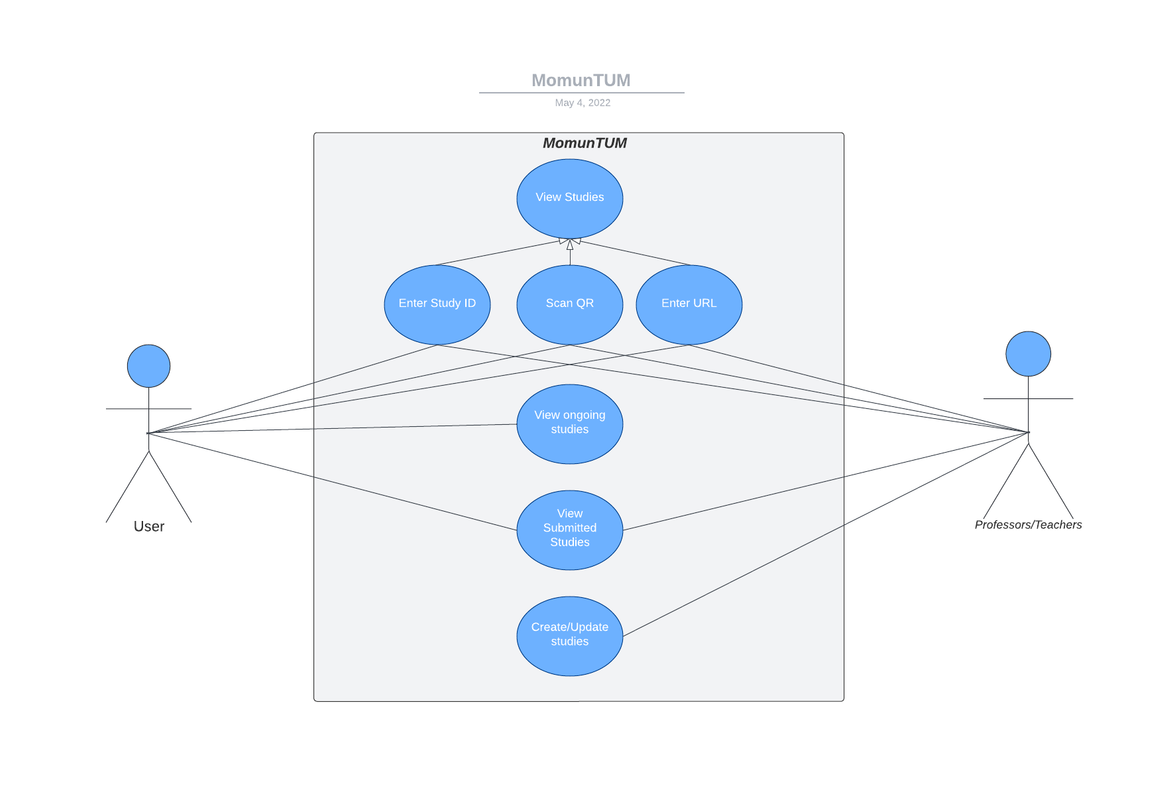The purpose of this document is to give the respective reader an overview of the general idea and implementation of the momenTUM mobile application and how it is built.
momenTUM is a cross-platform mobile application for collecting and monitoring intervention studies. It is licensed under the GNU General Public License v3.0.
It supports:
- A diverse range of elements, including slider, text input, date/time, audio, video, image, and more, with support for branching logic.
- Flexible module scheduling, to deliver surveys and/or interventions to participants at random or fixed intervals.
- Participant randomisation into distinct conditions with different modules and scheduling.
- Study registration via scanning a QR code or directly entering protocol URL.
- Dynamic feedback charts to track participant progress on specific variables.
- Distributed architecture, such that study protocols and data can be stored on your own server.
- Ionic - Cross-platform mobile app development
- node.js - Cross-platform JavaScript run-time environment
- Chart.js - Open source HTML5 charts
- A student/subject will have the option to use the reaction-time test.
- A student/subject will have the option to see draft studies that they did not submit yet.
- A student/subject will have access to see already submitted studies.
- A student/subject can have access to see all the surveys in the study.
- A student/subject can view new and upcoming studies or already submitted/ongoing studies.
- A student/subject has the option withdraw from the study
- A student/subject can choose notification preferences.
If you use schema in your own research, please cite the following:
Shatte, A. B. R., & Teague, S. J. (2020). schema: An open-source, distributed mobile platform for deploying mHealth research tools and interventions. BMC Medical Research Methodology, 20(1), 1-12. Retrieved from https://bmcmedresmethodol.biomedcentral.com/articles/10.1186/s12874-020-00973-5
Shatte, A. B. R., & Teague, S. J. (2019, June 12). schema (Version 1.0). Zenodo. http://doi.org/10.5281/zenodo.3243918
For a more detailed tutorial on how to develop Ionic projects visit:
Navigate to the destination of your project and clone the GitHub repository:
cd /full/path/to/your/destination
git clone https://github.com/TUMChronobiology/momenTUM-app.git
cd momenTUM-app
Install node and npm or check whether they are installed:
node -v
npm -v
Install global npm packages:
npm i -g @ionic/cli @angular/cli native-run cordova-res
Navigate to the momenTUM-app folder and install the dependencies:
cd /path/to/momenTUM-app
npm i
Run a development server with live-reload in your browser:
ionic serve
Notice: iOS apps can only be developed on macOS with Xcode installed.
Download Xcode:
Once Xcode is installed, make sure the command-line tools are selected for use:
xcode-select --install
Create an iOS emulator:
- Open Xcode.
- Navigate to Window » Devices and Simulators.
- Create a new simulator, if it doesn't already exist.
Generate a native project:
ionic cap add ios
Open in Xcode:
ionic cap open ios
Sign the App:
- Click on the Project root.
- under the Signing section, ensure Automatically manage signing is enabled.
- Then, select a Development Team.
You can now close Xcode and build & run the App on iOS with live-reload:
ionic cap copy ios
ionic cap run ios -l
For debugging, you can use the Safari Browser:
- Open Safari
- Navigate to Develop >> name_of_emulator >> localhost
Alternatively, you can run the native iOS Project in Xcode.
Install Android Studio:
Install the Android SDK by opening Android Studio. It will lead you through the installation. Open ~/.bashrc, ~/.bash_profile, or similar bash startup scripts and add the following lines:
export ANDROID_SDK_ROOT=/Path/to/android/sdk
# avdmanager, sdkmanager
export PATH=$PATH:$ANDROID_SDK_ROOT/tools/bin
# adb, logcat
export PATH=$PATH:$ANDROID_SDK_ROOT/platform-tools
# emulator
export PATH=$PATH:$ANDROID_SDK_ROOT/emulator
In Android Studio, open the Virtual Device Manager and create a Virtual Device. Run the Device and keep the emulator running. Generate the android native project by running the following inside of the momenTUM-app directory:
ionic cap add android
Build the web assets and copy them into the native project:
ionic cap copy android
Run the app with live-reload:
ionic cap run android -l
For debugging, open chrome://inspect with the Chrome Web Browser.
Alternatively, you can run the native Android Project in Android Studio.
For testing, run the following command.
ng test
For a code-coverage report:
ng test --no-watch --code-coverage
Cypress is used for E2E-Testing, which simulates a user interacting with the app. To run, start the app in the browser and then start cypress. A new cypress window will open.
ionic serve
npm run cypress
